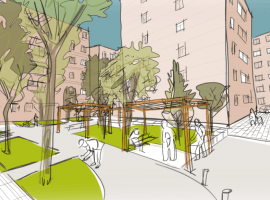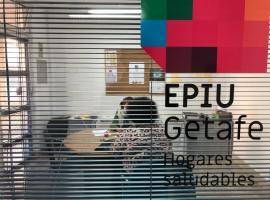EPIU’s objectives are in line with EU, national and regional latest political priorities
EPIU focuses on one of the EU challenges: energy poverty
Energy poverty is a situation in which households are unable to access essential energy services. With nearly 34 million Europeans unable to afford to keep their homes adequately warm in 2018[1], energy poverty is a major challenge for the EU.
The European Pillar of Social Rights includes energy among the essential services which everyone is entitled to access. Support for access to such services must be available for those in need[2]. Furthermore, the recast of the Electricity Directive, the revised version of the Energy Performance of Buildings Directive (EU) 2018/844 or the Energy Efficiency Directive requires Member States to take appropriate measures to address energy poverty. Furthermore, the Next Generation EU confirms the Renovation Wave’s role as one main facilitator of the green recovery.
EPIU, 100% aligned with the National Strategy against Energy poverty in Spain
There is no standard definition of energy poverty, and it is therefore left to Member States to develop their own criteria according to their national context. In their NECP, Member States have to assess the number of households in energy poverty.
In Spain, the National Strategy against Energy Poverty 2019 – 2024 seeks to address a situation that affects between 3.5 and 8.1 million citizens, reducing at least 25% current indicators but seeking to reach 50%. Although the strategy entered into force after EPIU was approved, the project is 100% aligned with its four axis:
- Improving knowledge about energy poverty
- Redesign of subsidy mechanisms such as the social bond for electricity and the social thermal bond.
- Creating a structural change for the reduction of energy poverty- energy efficiency and rehabilitation
- Implementing measures to protect consumers and social awareness
COVID-19 has highlighted the importance of projects as EPIU
The Covid crisis, labelled as a “total social fact”, has highlighted the urgency of addressing energy poverty if we are to create a social Europe that guarantees the basic needs of all its inhabitants. Projects as EPIU will contribute to overcome the situation in an effective manner.
Regional and local initiatives complementing EPIU and vice versa
Regional strategies of Comunidad de Madrid on different areas such as the Strategy of Social Inclusion 2016-2021 or the employment policy design a region with full employment and no poverty and complements EPIU objectives of identifying and fighting energy poverty.
Besides, EPIU will support Getafe’s social pillar, contributing to identify situations of hidden vulnerability and offering support to tackle energy poverty.
[1] 2018. Eurostat, SILC
[2]https://ec.europa.eu/commission/priorities/deeper-and-fairer-economic-and-monetary-union/european-pillar-social-rights/european-pillar-social-rights-20-principles_en




























